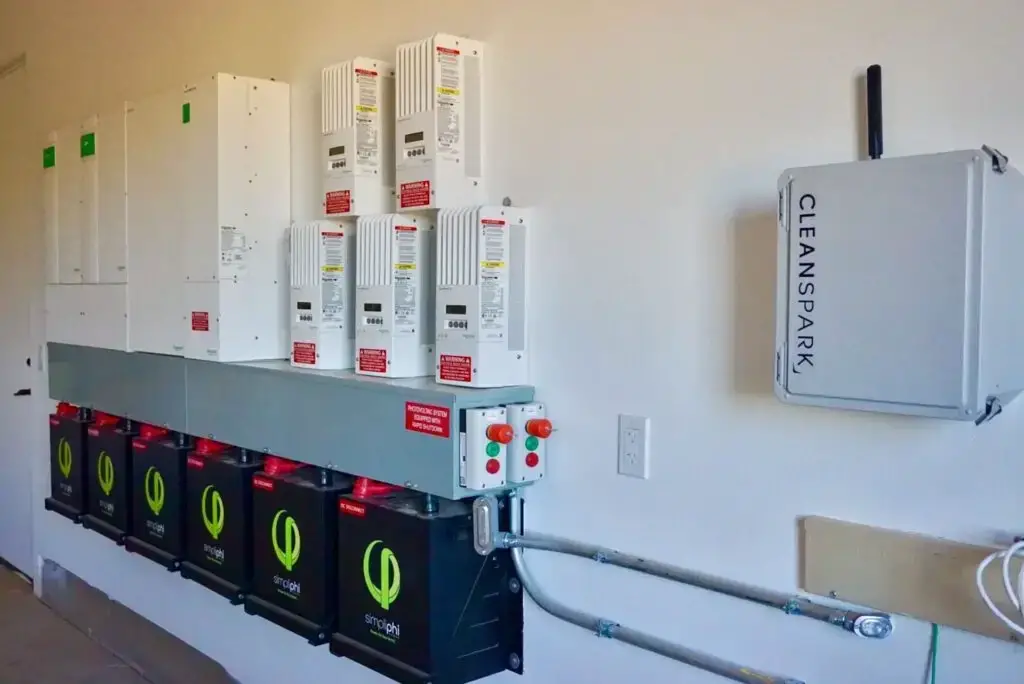Solar energy is a renewable energy source that’s growing in popularity. There are a lot of places that are now making use of solar energy. It’s not just because of the environmental benefits, and what is a solar panel without a solar battery?
Solar power is cheaper, especially if you install suitable solar batteries and regulators and run them for long periods. Here is what you should know about solar batteries.
Table of Contents
Are Solar Batteries Worth It in 2022?
In 2022 and beyond, solar batteries will be a necessity. As feed-in tariffs continue to drop, the value of pure solar energy diminishes unless it is stored in battery form.
If you don’t have a battery, then the moment darkness falls, your utility meter starts ticking.
Batteries can put you to be in total control of your power during blackouts than generators.
By contrast, the initial investment is lower when you have a battery-powered system in your home.
Solar Battery Battery Types
Lead Acid Batteries
Lead acid batteries are the most common for off-grid and grid-tied applications. They have an average life span of 3-5 years.
Lead Acid Batteries work in applications requiring heavier loads. These can be, starting vehicles or sustaining high energy usage during cloudy days.
They are inexpensive and easy to maintain. However, they require regular maintenance, such as checking the electrolyte levels and adding distilled water.
You cannot overcharge these batteries since doing so may damage them permanently. In addition, cause them to vent explosive hydrogen gas, which can cause personal injury or property damage.
For this reason, you should find a professional who is knowledgeable about lead acid battery maintenance and installation procedures.
Flow Batteries
Flow batteries are similar to standard lead-acid batteries, However flow batteries do not need electrolyte replacement. This is because the electrolyte is contained within a special membrane.
They can be charged quickly and last longer than other batteries.
Flow batteries that use electroactive polymers as electrolytes are redox flow batteries (RFBs).
The main advantage of RFBs is that you can scale them up to very large sizes. This makes them suitable for grid storage applications.
They are also relatively inexpensive and straightforward to operate. However, because these batteries use organic materials as electrolytes, their life span is limited by degradation over time.
Lithium Ion Solar Battery
Lithium-ion batteries are used in many other applications, including laptops, cell phones, and tablets.
Lithium-ion batteries have a high energy density and can hold a charge for a long time.
Like all lithium-ion batteries, they require periodic maintenance to keep them working optimally.
They are made up of three main components: an anode, cathode, and electrolyte.
The anode is made from graphite in lithium-ion cells and metal oxides. The cathode comes from lithium oxide in both types of cells and has a porous structure. It allows ions to move through it during use and charging.
The electrolyte is typically a gel or liquid that contains lithium ions. These ions can move back and forth between the anode and cathode during charging cycles.
Nickel Cadmium Solar Batteries
Nickel Cadmium (NiCd) batteries have been around since the 1930s. They are not as common today as they were in the past because they require more maintenance than other types of solar batteries.
However, they are still used in some applications where weight is less important than cost or availability.
These types of batteries can last up to 10 years if they are well cared for and maintained properly.
The lifespan of a Nickel Cadmium battery depends on how often it is charged and how much power it draws from the grid before being charged again by solar panels or wind turbines.
Do I Need a Solar Battery?
If you don’t require battery backup for your solar system, then the intricacies of incorporating one are largely irrelevant.
Suppose you’re considering making the switch to solar energy or already have a basic system with panels and an inverter, it is very important to include batteries in your setup.
If you’re not getting paid to send excess energy to the grid, you’ll be paying for electricity when your solar panels aren’t producing enough power.
This is wasteful, you created extra energy this morning, and now it isn’t available at night!
A battery storage solution is vital to make your system efficient, economical, and able to produce power when you need it most.
If you’re unsure about going solar, installing a battery in your home can make it cost-effective.
A smart energy system maximizes savings by drawing on the most cost-efficient power source at any given moment.
Are Solar Batteries Affordable?
Some people object to getting a solar battery on the basis of its cost. The greater the kilowatt hour (kWh) capacity, for example, the higher price.
It all depends on your specific needs and how much money you’re willing/able to spend.
Solar batteries typically cost between $4,500 and $18,000 (not including installation costs).
Still, the benefits of going solar are clear: over time, you will save money while increasing your independence from utility companies.
How Much Solar Battery Storage Will I Need?
The extra expense is wasted money if you buy a battery that’s too large for your needs.
By looking at your most recent electrical bill, you can estimate how much energy it takes to power your house over a 24-hour period and find the numerical equivalent of kilowatt hours (kWh) needed.
Once you have an idea of your peak usage, it’s easy to calculate how many kWhs you will need to store.
When sizing your solar battery system, you want to get it right. Too small, and you’re still paying for some of your power from the grid; too large, and you spent more than necessary.
Soon, more people will be charging an electric vehicle at home, so you’ll need to ensure that your solar panel system can handle the extra load.
How Long Do Solar Batteries Last?
The lifespan of your solar battery depends on how often you use it, how long you leave it in the sun, and how well you take care of it.
If you use your solar battery frequently and charge it before it’s fully drained, you’ll get more life out of your battery than if you let it go dead before charging.
A fully functioning solar battery will last anywhere between 5 and 15 years.
Benefits of Using Solar Batteries

Greater Energy Security
The biggest benefit of solar batteries is greater energy security. When relying on the utility grid for your power needs, it’s impossible to control how much energy you use at any given time.
Anytime clouds blanket the sky or an unexpected storm rolls in, it could mean blackouts for some people.
With a solar battery system in place, this isn’t a concern because you’ll always have a backup energy supply available when needed.
Make the Most of Your Power
When using solar panels, it’s important to take advantage of every watt of sunlight that hits them, especially if they’re not getting enough sun.
A solar battery will help you do just that! If there’s too much power being produced by your panels when it’s sunny out, there won’t be enough space left in your home’s wiring system to handle it all.
But this isn’t a problem with a battery. It can hold onto extra watts until you need them later down the road when it’s cloudy outside or after dark.
This means you’ll get more out of every kilowatt hour.
No Noise Pollution
Electricity generated from fossil fuels causes noise pollution. This is because the process involves combustion, which creates noise and other forms of pollution like carbon dioxide and sulfur dioxide.
On the other hand, solar batteries do not produce any noise pollution or air pollution because they do not burn fuel to generate electricity.
Reduced Electric Bills
Solar batteries can help reduce your monthly electric bills by up to 90%, depending on where you live and how much electricity your household consumes on average per month.
This means that if you have many appliances that consume a lot of electricity, you should consider investing in a solar battery system to reduce your monthly payments while also saving money in the long run.
Reduces Carbon Footprint
Solar power is one of the best options for reducing your carbon footprint because it does not emit any harmful pollutants into the atmosphere.
Solar batteries can store energy during the day so that you can use them at night or when there is no sun.
This means that you will not have to rely on fossil fuels as much, which reduces the number of carbon emissions you produce.
Conclusion
The last thing you want to worry about when investing in a solar battery is whether it will live up to your expectations.
There are, indeed, a variety of factors that should be considered before making such a purchase.
To help you find the product that’s right for you, use the information from this article to learn how to find the best solar battery for all of your needs.

